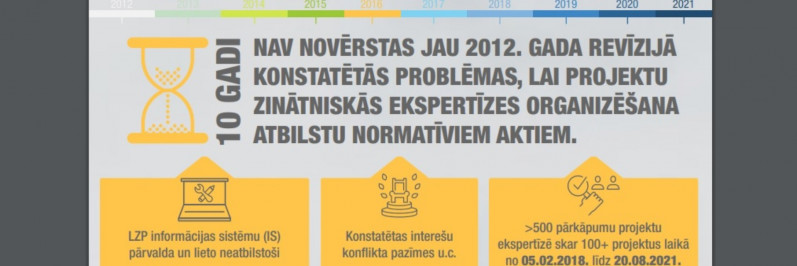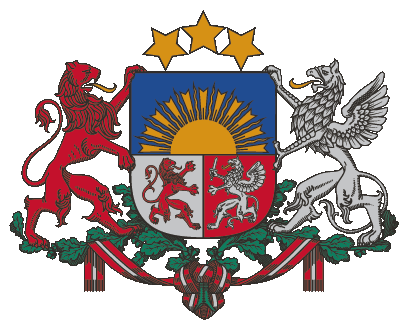
There is no confidence gained that the funding of Latvian science of more than 82.5 million euros was directed to the most promising research according to the purpose of promoting the growth of the Latvian economy. There is not enough done to address the problems and deficiencies identified almost 10 years ago both in terms of the approach of the Ministry of Education and Science (MES) to set priorities in science directions and in terms of controlling the use of funding for science such as project evaluation and monitoring of their implementation, which is largely the responsibility of the Latvian Council of Science (LCS). These are key conclusions made after the audit performed by the State Audit Office aimed at assessing whether and how MES succeeded in implementing the recommendations provided after the audit conducted in 2012 to improve the implementation of Latvia’s science policy significantly.
Briefly
- There is no effective and sustainable system for evaluating scientific projects, allocating and controlling financing established for almost a decade. One must admit mistakes and change the existing system.
- Although the available state budget funding for the development of science in Latvia has increased in recent years, it has been low for a long time compared to the other EU Member States. Its purposeful investment in solving issues and problems important for Latvia is crucial by supporting fundamental and applied research projects (FARP) and national research programs (NRP) with the highest scientific quality.
- The number of priority research areas is too wide because it includes at least 150 topics that are not adequate in conditions of limited funding.
- The implementation of the recommendations provided by the State Audit Office will remedy the irregularities and inconsistencies in the organisation of the scientific review already reported to the responsible institutions for fact-finding (CPCB, SRS, Prosecutor’s Office).
Member of SAO Council and Director of the First Audit Department Ms Inese Kalvāne shared, “No doubt that the development of science requires appropriate funding, but ensuring a fair and transparent system for approving, evaluating and monitoring scientific research projects is just as important or even more important. If we want a globally competitive Latvian science, then the mistakes made so far must be acknowledged, and every effort must be made to eliminate them.”
The State Audit Office has established that the MES has improved several areas essential for the development of science. In addition, according to the international evaluation of scientific institutions conducted in 2019, progress has been observed in Latvian science since 2013. However, the violations and discrepancies identified in the audit now show that not everything planned has been reached and that the MES has not done enough to eliminate the previously identified shortcomings, mainly:
- The set priorities of the scientific directions for 2018-2021 are too broad, lose any efficiency and do not fulfil their task to focus the work of Latvian scientists, people involved in scientific research, and scientific institutions on solving the most important issues for sustainability and development of Latvia. Namely, despite the resources invested (including 14 thousand euros for the study), the priorities of science directions for financing FARP do not work because they are inefficient. The necessary focus on the research areas with the greatest development and development potential has been ensured by other factors: the main criterion for awarding funding, that is, the scientific quality of projects and the procedure for distributing funding specified in the FARP tender regulations.
- The most disturbing conclusion refers to the fact that one has failed to eliminate the previously identified problems in the organisation of scientific review of projects so that it complies with the requirements of laws and regulations. We have found inappropriate use and management of the LSC information system (IS), which affects more than 100 projects (reviews of projects from 5 February 2018 to 20 August 2021), signals of conflict of interests, etc. There are 25% of the funding allocated to the NRP “Latvia’s Heritage and Future Challenges for the Country Sustainability”, NRP “Power Industry”, and NRP “Mitigating the COVID-19 Consequences” or almost 1.9 million euros not supervised enough in indirect costs of projects. It shows that the Latvian Council of Science has failed so far to ensure the good functioning of the management and control system of the funding for science, not allowing the slightest doubt about the distribution of limited funds and careful evaluation and further use of the results of research projects.
Ms Kalvāne emphasised, “During this audit as well, we have found violations and significant discrepancies in the organisation and performance of the scientific review of FARP and NRP between 2018 and 2021. Consequently, it calls the validity of the decisions taken during this period to allocate the funding of 82.5 million euros to FARP and NRP projects and points to the potential influence on the results of the scientific project tenders. We also found inconsistencies and shortcomings in the use of financial resources allocated for the implementation of NRP projects in terms of supervision and control.”
The State Audit Office has addressed the Prosecutor’s Office of the Republic of Latvia, the State Revenue Service, and the Corruption Prevention and Combating Bureau regarding alleged violations of laws and regulations and further examination of the established facts.
The recommendations of the State Audit Office to the line ministry, Ministry of Education and Science
The Ministry of Education and Science has been provided with specific recommendations to (1) comply with the requirements of laws and regulations, (2) to identify and eliminate shortcomings in procedures on time, and (3) to spend state budget funding appropriately. The implementation of the recommendations requires the following urgent actions:
- Streamline the control environment and supervision measures over the organisation of scientific review of FARP and NRP projects, ensure the transparency of the expert selection process further on, including the justification of the decision on attracting a foreign expert must be traceable;
- Define the status, and legal framework of the LCS IS by creating an information technology security management environment that complies with the Cabinet Regulation simultaneously;
- Improve the internal control system for LCS IS user governance, i.e. draft a procedure for the management of user rights (assignment, revocation, renewal, regular inventory), as well as improve the user authentication mechanism for access to LCS IS by providing for automatic replacement of the originally issued password, regular change of password, excluding the possibility of password recurrence;
- Assess the responsibility of LCS employees for the violations identified during the audit in the organisation and provision of the scientific review process.
In general, the MES must revise the approach to setting the priorities of scientific directions so that the state budget funding would be focused on solving issues important for Latvia’s sustainability and development. The State Audit Office also calls for the control environment and supervision measures for the planning and implementation of the NRP projects and the use of funding to comply with the laws. In addition, in cooperation with the Latvian Council of Science and the Ministry of Economics, the Ministry of Education and Science must evaluate the opportunities of adjusting the cost items of goods and services of NRP projects and transfer the financing not required for the projects back to the state budget.
During the audit, the State Audit Office has received proposals for improving the selection of scientific projects (FARP and NRP) from more than 200 foreign experts who participated in reviewing project applications submitted by Latvian scientists in project tenders. Those proposals are also included in the audit report. The MES has committed to implementing the recommendations of the State Audit Office before mid-2022.
Additional information
